Alvedia Lab Test
This treatment applies to the following species:LAB TEST TECHNOLOGY
FOR BLOOD TYPING IN CATS & DOGS
THE FIRST IMMUNO-CHROMATOGRAPHY TECHNIQUE
With the same monoclonal antibodies previously used in the Gel Test Technology (Gold Standard).
LAB TEST MATERIAL
FOR DETERMINATION OF THE DEA 1 BLOOD TYPE IN DOGS, AND A/B BLOOD TYPES IN CATS.
Our technology is based on the monoclonal antibodies that have been incorporated on a specific membrane. These monoclonal antibodies (anti-DEA 1, anti-A and anti-B) were previously used in the gel test technology.
1 BOX OF LAB TEST CONTAINS:
- 1 Tube With 20 membranes (1 Membrane = 1 Test)
- 1 Dropper Bottle of Buffer (5 mL)
- 1 Schematic Test Manual
- 20 Results Forms
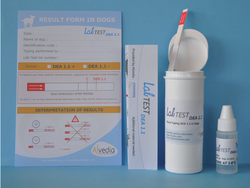
Similar materials provided for both feline and canine lab tests.
Additional Material Needed
- 1 microplate 96 round bottom wells (this can be purchased from Animal Blood Resources International)
- 1 pipette (with tips)
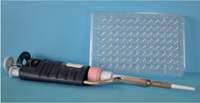
LAB TEST ADVANTAGES
● 10 µl of Blood
● 2 Minutes
● Quick
● Easy to Use
● Clean
● Accurate
● Can be Archived in Patients File
LAB TEST PROCEDURE
Step 1
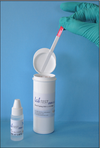
Take one membrane out of the white tube, or more if you need to blood type several animals.
Step 2
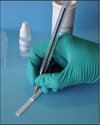
Write down the name of the patient below the arrow. Be careful to write on the blotting paper only.
Step 3
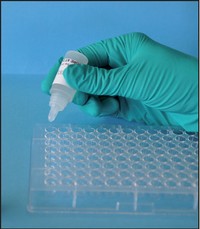
Add three drops of buffer into one of the wells.
Step 4
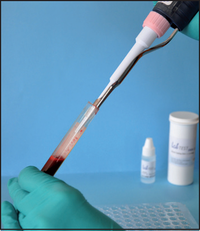
Collect 10 µL of whole blood using a pipette.
Step 5
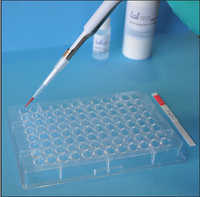
Add the 10 µL of blood into the well filled with buffer, mix gently.
Step 6
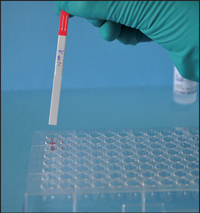
Insert membrane into the well to allow cell migration.
Step 7
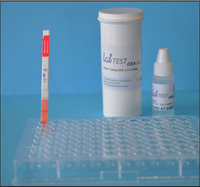
Wait for the complete migration of cells, until the control line becomes completely visible. If the control line does not appear, the test needs to be repeated.
Step 8
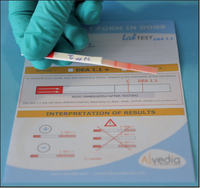
Stick the membrane onto the result form to interpret the test.
Step 9
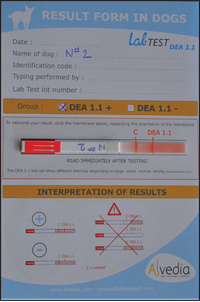
The dog is DEA 1 positive. Record this card.
LAB TEST RESULTS
THE DOG IS DEA 1 NEGATIVE

The absence of a red line in front of the DEA 1 arrow indicates a negative reaction.
THE DOG IS DEA 1 POSITIVE

The presence of a red line in front of the DEA 1 arrow indicates a positive reaction.
THE DOG IS WEAK DEA 1 POSITIVE

The presence of a weak red line in front of the DEA 1 indicates a positive reaction.
THE CAT IS TYPE A

The presence of a red line in front of the ‘A’ arrow indicates a positive reaction for the A group and a negative reaction for the B group.
THE CAT IS TYPE B

The presence of a red line in front of the ‘B’ arrow indicates a positive reaction for the B group and a negative reaction for the A group.
THE CAT IS TYPE AB

The presence of 2 red lines in front of both ‘A’ and ‘B’ arrows indicates a positive reaction for both the A and B groups.
Importance Of Blood Typing
In Dogs
The determination of a dog’s DEA 1 antigen status is strongly recommended before any blood transfusion to avoid a potent alloantibody response against the antigen, and to avoid an acute hemolytic transfusion reaction.
In Cats
The presence of naturally occurring alloantibodies in Type A and in Type B cats requires that blood typing be performed prior to blood transfusions to avoid an acute hemolytic transfusion reaction, and in breeding to prevent neonatal isoerythrolysis. Blood can be taken directly from
the umbilical cord.
LAB TEST SCIENTIFIC INFORMATION
The Dea 1 Antigen
ALVEDIA’S scientific team established the DEA 1 antigen presents a large range of expression level on the RBC surface by using flow cytometry technology. Similar to the Rhesus D molecule in humans (named weak D or DU), some dogs express low levels of the DEA 1 antigen (called weak DEA 1). This work shows that the weak DEA 1 antigen was previously typed as DEA 1.2. A large study on more than 500 dogs shows that our membrane technology detects perfectly all ranges of the DEA 1 antigen, from very strong to very weak. Consequently, the DEA 1 line will always show different intensities.

Reliable In Case Of Auto-agglutination

Thanks to our specific membrane technology, the agglutinated red blood cells will be retained at the bottom of the membrane, whereas non agglutinated cells will carry on migrating to the top of the membrane.
Reliable In Case Of Low Pcv (anemia)

Thanks to the sensitivity of our specific monoclonal antibodies, even a low PCV will allow you to obtain a reliable blood typing results.
Alvedia
Alice Veterinary Diagostic
To Place an Order:
Contact
ANIMAL BLOOD RESOURCES INTERNATIONAL
Phone: (800)-243-5759
www.abrint.net
P. O. BOX 1118, Dixon, CA 95620
CPN: 13980122
P.O. BOX 609, STOCKBRIDGE, MI, 49285
| Telephone: | 800-2HELPK9 (800-243-5759) | |
| Fax: | 517-851-7762 | |
| Website: | www.ABRInt.net | |
| Email: | customerservice@ABRInt.net |
 |
THIS SERVICE AND DATA ARE PROVIDED "AS IS". DVMetrics assumes no liability, and each user assumes full risk, responsibility, and liability, related to its use of the DVMetrics service and data. See the Terms of Use for further details. |

Copyright © 2025 Animalytix LLC. Updated: 2025-08-27
